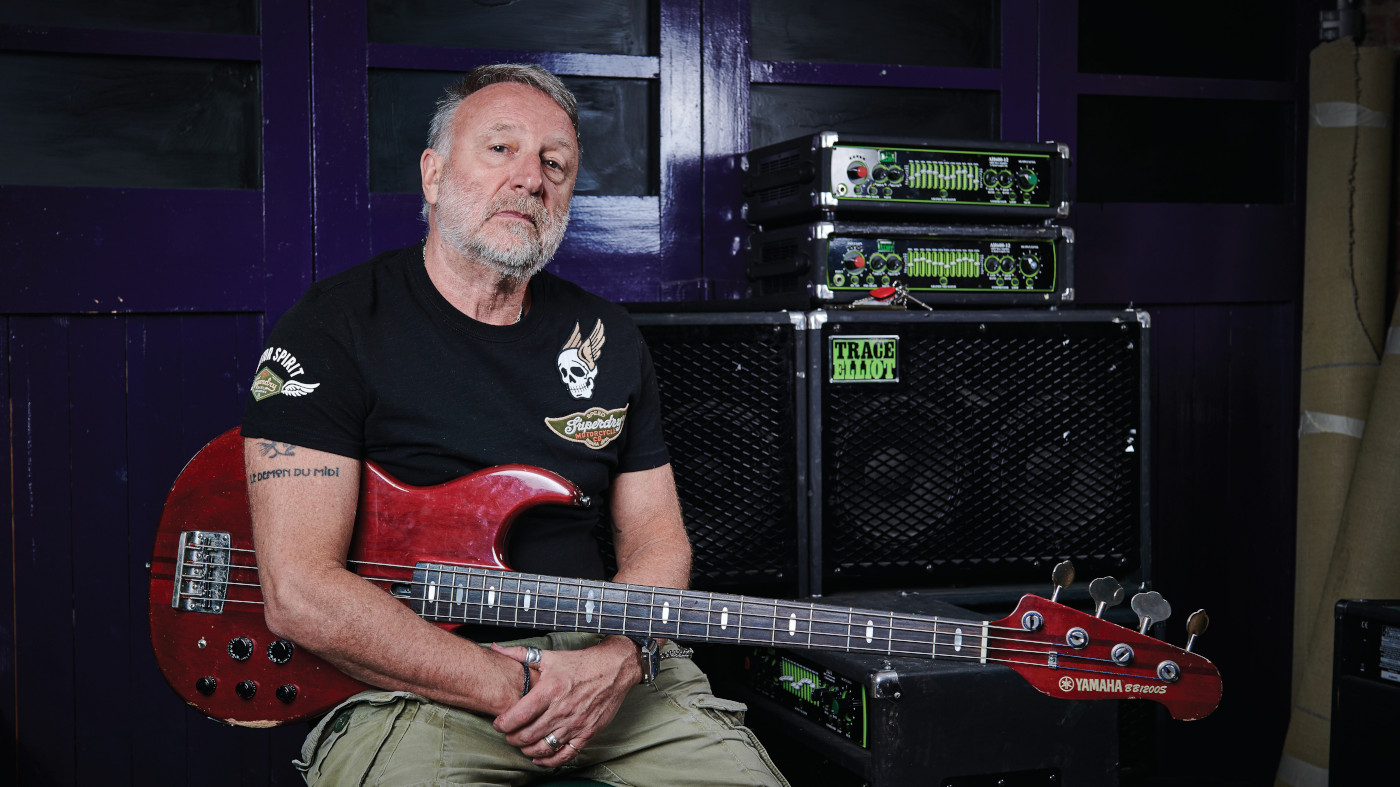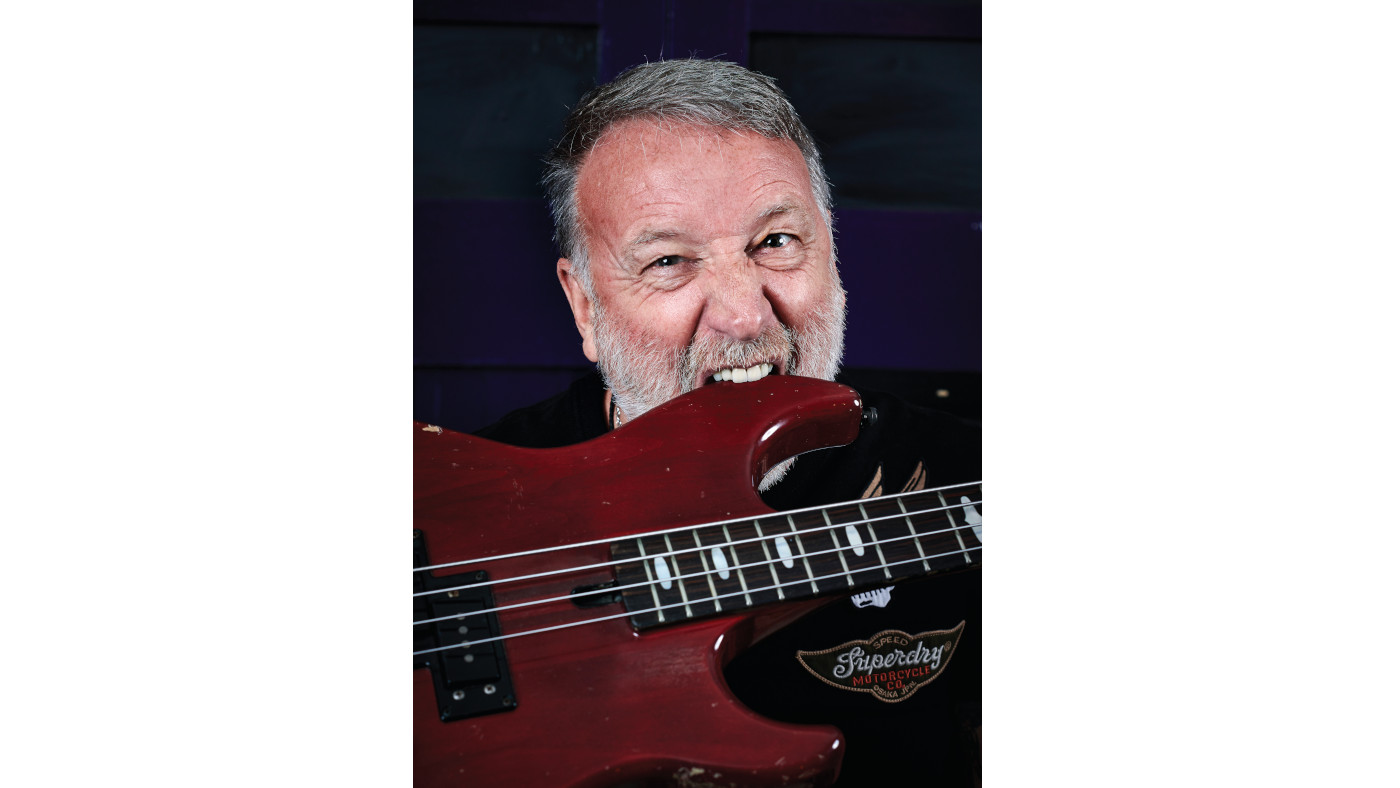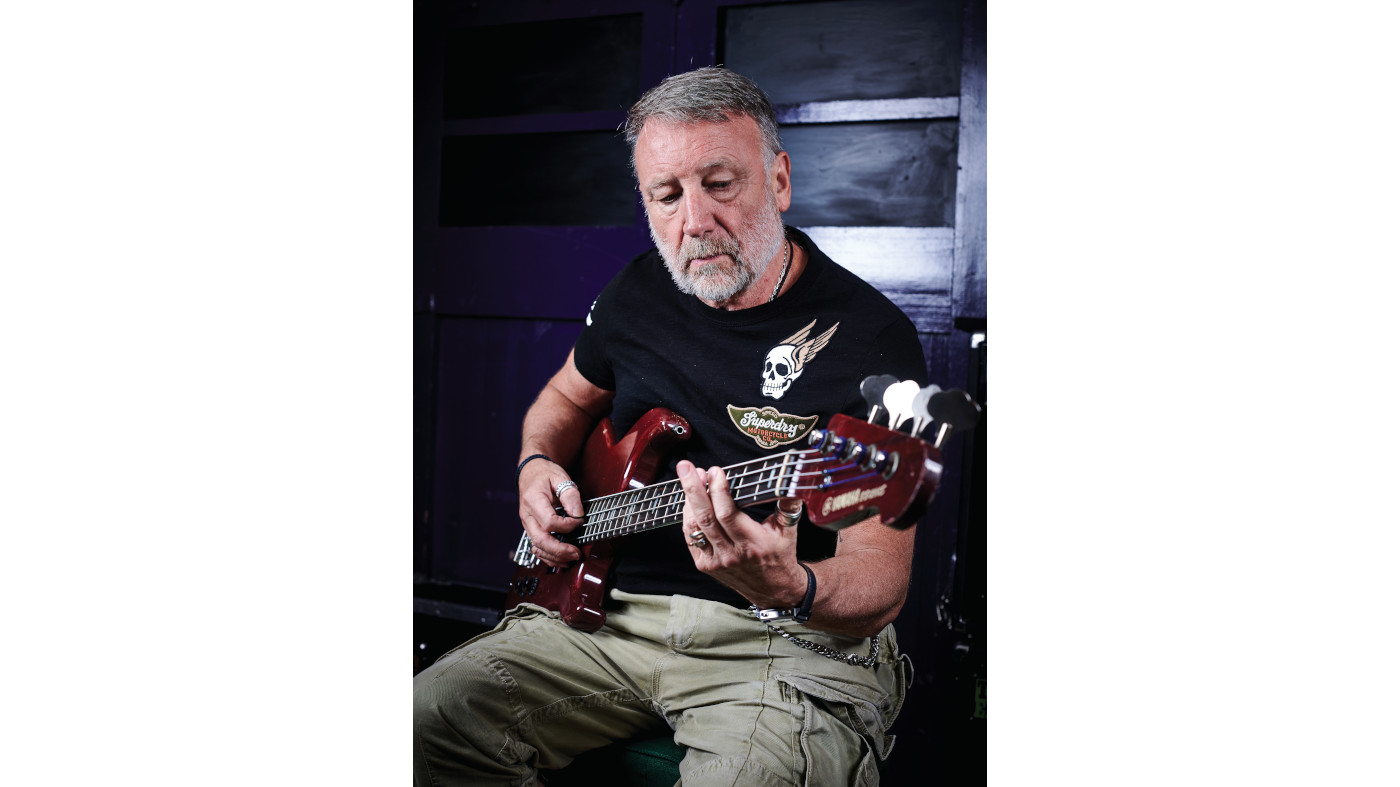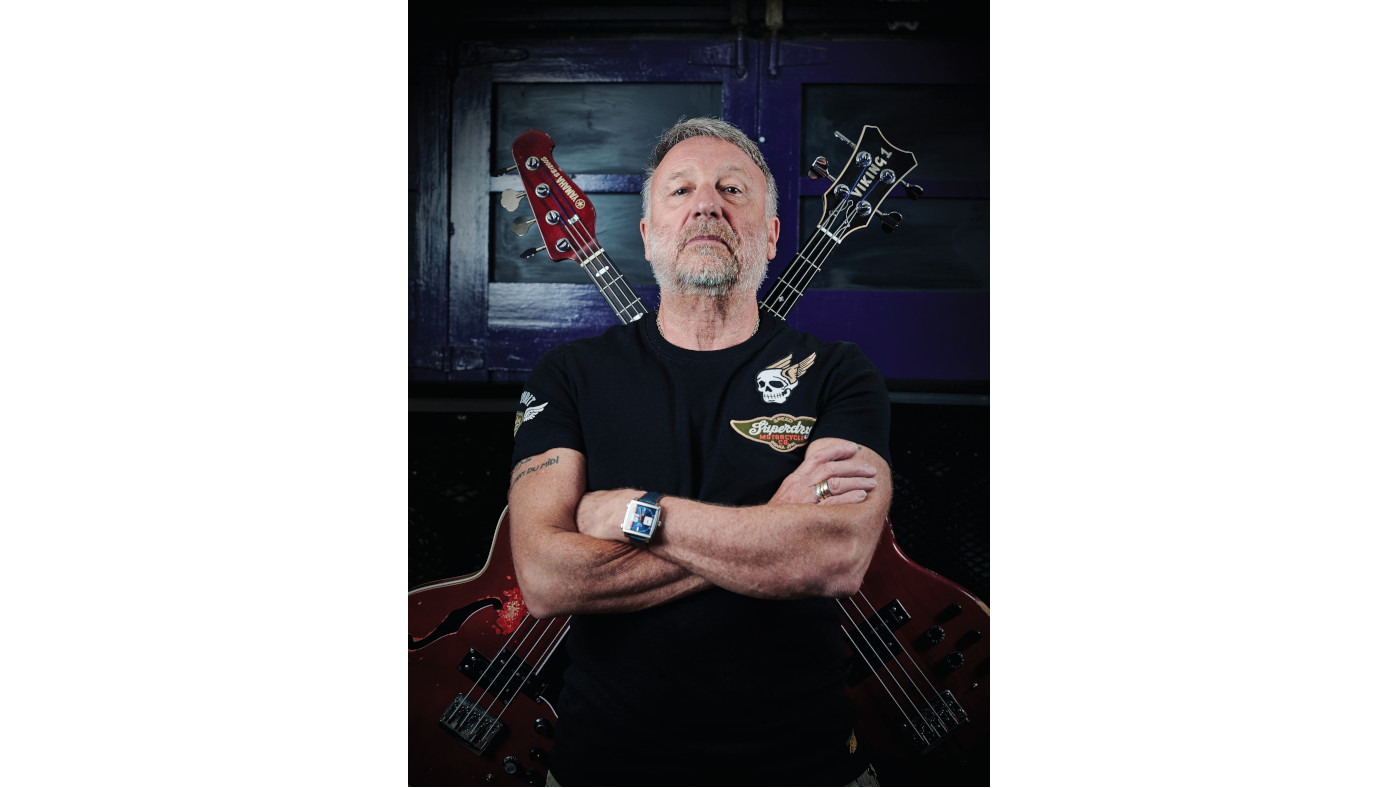Peter Hook: “I’ve never liked to be hidden, and I don’t like to be patronised. I don’t buy into the idea that the bass player is the quiet one”
The Joy Division and New Order hero looks back on his genre-defining legacy

Want all the hottest music and gear news, reviews, deals, features and more, direct to your inbox? Sign up here.
You are now subscribed
Your newsletter sign-up was successful
“I guess I was just lucky with the riffs,” reckons Peter Hook, the founding member of Joy Division and New Order, who now heads up his own group, The Light. Seated across the table from him in an upmarket Italian restaurant on the outskirts of Manchester, this thoughtful nugget feels like a front-runner for understatement of the year.
On Unknown Pleasures (1979) and Closer (1980), Joy Division’s two albums before the tragic death of their singer Ian Curtis, Hooky invented a style of bass playing that continues to register and inspire to this day, with his moody post-punk grit sitting at the very forefront of the mix.
The guy in the shop asked which one I wanted and that stumped me, I just kept saying ‘bass’ guitar
In New Order, he experimented even further, embracing the new technology of the 80s to mutate his acerbic low end into electro-pop, once again doing what had never been done. As readers of this magazine know perfectly well, it is no stretch at all to consider the man one of the most influential English players since Sir Paul McCartney himself.
“We went to a Sex Pistols gig and decided to form a band and the next day [guitarist] Bernard Sumner said ‘Go get a bass’,” relates Hook, taking us back to that life-changing day as lunch is prepared in the kitchen. He jokes that the idea to start the band was a case of realising that “we could just as easily stand there telling everyone to fuck off, if that’s what groups did”.
Borrowing £35 from his mother, he went to Mazel’s in Manchester in search of a bass, but there was one slight problem - he didn’t quite know what a bass guitar was or did. “The guy in the shop asked which one I wanted and that stumped me, I just kept saying ‘bass’ guitar. He must have thought, ‘God, I’ve got a right one here, another idiot from that Sex Pistols gig!’ When he grabbed the nearest one, I said it wouldn’t do because there was only four strings - and that’s when he told me, ‘No son, basses only have four’.”
The punk convert proudly rode the bus home with his new Gibson EB-0 replica wrapped in a black binliner and its headstock poking out. He “plinked and plonked” that night and then began rehearsing with Bernard the following day, with no idea of even how to tune the thing. “It really was the most inauspicious start,” he laughs, adding: “if the bookies had a bet on these two idiots amounting to anything, the odds against us would have been pretty high. To go on and be in two earth- changing bands was pretty surprising for me as well, you know...”

Unknown and unruly
Looking back on the impact of Unknown Pleasures - recently repackaged on limited edition vinyl for its 40th anniversary - it almost feels inevitable that it became such a landmark release in rock music. Hook’s driving bass-lines had all the aggression of punk, funnelled into an outside suspense, creating a new sonic blueprint that felt every bit as expressive as music could be. At the time, however, it was more as if they were making it up as they went along.
Want all the hottest music and gear news, reviews, deals, features and more, direct to your inbox? Sign up here.
“We were teenagers - confused, anxious and rebellious - because that’s what teenagers are,” shrugs Hook, before the cheeky wink that comes ahead of all his classic one-liners. “Guess it’s my hormones I need to thank, then!”
I never needed a compressor, because I hit my guitars so hard they just flatline completely every time
When we point out that it’s hard to imagine Unknown Pleasures sounding the same if it had been made by more theoretically enlightened musicians, Hooky nods in wholehearted agreement. Although Joy Division may have been playing a more intelligent form of punk rock, it was punk rock nonetheless.
“We made glorious mistakes because we were self-taught,” he muses. “There’s this theory that when any punk band tries to learn the rules, they can’t do it any more. There’s evidence for that, they can get too conscious. Still, some of our songs are hard to play even now. It’s all down-picking. I never needed a compressor, because I hit my guitars so hard they just flatline completely every time. I never step back. Songs like Transmission can make your hand feel like it’s about to drop off. But I never warm up. I don’t even practise at home, I find it boring.”
Hook regards Joy Division’s debut as “more of a jam record with as many bum notes as any of your favourite albums from the 60s, 70s or 80s”.
Whenever producer Martin Hannett felt the bass chords needed more clarity, they would record notes separately and simply add them together. The members would talk about their ambitions but rarely discussed the music itself - exploring a creative subconscious through a natural, primitive instinct. There was also the fact they didn’t have the time or money to fix the mistakes they inevitably made.
“People would ask why the first verse was 16 bars and the second only eight,” says Hook, “but there’s no cataclysmic reason behind it. We just counted wrong, but it sounded good, so that was that. Martin helped me design the loudest fucking bass rig you’ve ever heard in your life - an Alembic Stereo preamp going into a Amcron DC-300A, which is 1000 watts a channel, in stereo, through two 1500 watt speakers. Once I put the chorus on, it was just mental. I was never going to hide behind a bush after that.”

Hearing ghosts
On Joy Division’s defining moment - the 1980 non-album single, Love Will Tear Us Apart - it was Hook’s contrasting open strings against notes high up the neck of a Hondo II Rickenbacker copy that inspired its sullen, era-defining vocal melody. This came from his refusal to stay in the background.
“They tried telling me once, asking if I could just follow the root,” laughs Hooky. “I said, ‘No - how about you fuckin’ follow me?’ - probably out of ignorance, because I didn’t know what a root note even was. I’ve never liked to be hidden, and I don’t like to be patronised. I don’t buy into the idea that the bass player is the quiet one who drives the van...” and there’s that cheeky wink again, before the admission that he was in fact behind the wheel for most tours.
[Trying a six-string bass] The devil in me realised that no-one else had one of these. It meant that I could play even more chords
Quiet he certainly wasn’t, and with encouragement from producer Hannett and singer Curtis, Hook soon discovered that the higher frets were where his potency was at its most ripe.
“Berny had a really loud amp right from the word go. I couldn’t hear myself at practice if I played low, so I went high - and that’s when Ian would be shouting, ‘Sounds great, do that, go high Hooky, go high!’ It was nice to be encouraged. A lot of those bass riffs were at his insistence.”
At the time, Hook recalls that Joy Division’s biggest single didn’t feel any more revolutionary than their other material. What did feel cutting-edge, however, was the Shergold Marathon Custom six-string bass that ended up on Joy Division’s final album, as well as later New Order tracks, thanks to a recommendation from the owner of their local Mamelok music shop.
“He probably wondered what kind of lunatics would play it... ‘Oh, I know!’ So I went and tried it. The devil in me realised that no-one else had one of these. It meant that I could play even more chords, which proved hugely inspirational on songs like ‘Passover’. I still love playing six-string basses: they don’t need to be as overdriven. The clarity makes them easier to use, but they’re also difficult because of the monster neck.”
It was the same shop owner who introduced them to Electro-Harmonix pedals, most notably the Clone Theory chorus which he told Hook could help fatten up the lower register even more. Tracks such as ‘24 Hours’ from Joy Division’s swansong album saw the final elements of that signature Hooky sound come to fruition.
“Those early EHX boxes are fantastic,” continues Hook. “I did have a collection at one point but it got stolen. What I loved about them was the sheer amount of noise, almost like birds tweeting. I took great delight in that, because Martin kept thinking he could hear ghosts.” Another wink. “He made me get a noise gate in the end...”
Signature Hook
After lunch and a round of coffees, we head to Hook’s home studio for an exclusive look at the equipment in his current rig. He points to various amps and speakers, including a couple of Yamaha BB1200S basses, a series that has been the staple of his sound since New Order started. As we learn, this long-enduring love affair was born purely out of chance.
“My Gibson EB-0 got stolen in America, but it was shit and kept going out of tune,” he admits. “So I went to Manny’s on 48th Street and the only thing that was any good was their Yamaha BB600. It felt perfect. I traded in for the 1000 and after that the 1200, which had a straight-through neck and two non-active pickups. Then someone from a shop called me up saying there was now a three-way active 1200S. I went straight there and never looked back. I’ve tried every other guitar in the world, but they just don’t do anything for me.”
Forget the awards and the money, I finally got my own signature bass!
Despite the music history on the walls and in the room around us, we learn of a recent development that’s given this world-renowned icon a well-overdue sense of having made it. There’s a Yamaha Peter Hook model on the way.
“Forget the awards and the money, I finally got my own signature bass!” he grins, explaining how Yamaha only caught wind through his son Jack Bates, currently playing bass in Smashing Pumpkins. “He told the reps I’d been using the same Yamaha for 39 years. They couldn’t believe it and wanted to do a version to my spec. I’m playing the prototype right now, it’s sounding lovely.”
Also in the room are Hook’s custom-made Chris Eccleshall basses, which he jokes are the instruments Yamaha refused to make him. By his own admission, the guitars are a “half-Yamaha, half semi-acoustic hybrid that only a nutter would want to play”. And of course, that makes them perfect for him.
Before long the conversation turns to the equipment and personal archive that was auctioned earlier this year. Treasures that went under the hammer included his very first EB-0 bass, the original Clone Theory pedal and the Shergold six-string.
“I actually sold pretty much all of my Joy Division and New Order memorabilia,” he says, adding that he shared the profits with three charities close to his heart. “I could play any six-string but it wouldn’t be the one used on those tracks. It was very special... the chemistry we had back then was perfect and rare, but that same chemistry is what splits you up because of a million other reasons. It was like a romantic breakup - instead of getting a haircut, I got new guitars.”

Seeing The Light
Since forming Peter Hook & The Light in 2010, in which his son Jack also played, Hook has been able to revisit his past in a way that’s truly faithful to its roots - performing his classic albums in their entirety. He describes the experience by comparing it to finding an old toy in the back of the cupboard. The rediscovery leaves him less concerned with looking for new ones. If he gets to retread former glories and continue to inspire, even learning a thing or two along the way, he’s more than happy.
I love going online to watch people playing my parts
“I love going online to watch people playing my parts,” he grins. “I haven’t seen one kid yet - and they’re all great players - that can do it the whole way through. They’ll nearly get there and fuck up, leaving me shouting, ‘Yes!’ I take great delight in watching people get 24 Hours wrong. The only person who can play like me is Jack. He pulls me up on things - saying I shouldn’t do it like that, telling me how to play my own riffs. And he’s usually right, to be fair!”
Holding his soon-to-be signature Yamaha bass up for our camera, and looking every bit the punk legend he is, Hooky regales us with a few lesser-known facts about his genre-shaping career. His sense of humour is every bit as razor-sharp as his tone.
“People used to tell me that as soon they heard the bass-line, they’d know it was me and I took that as bad - so I tried playing differently,” he shrugs. “I even had a friend show me how to slap, which ended with him saying, ‘Don’t bother!’ I’ve been offered so many gigs - Echobelly, Elastica, Primal Scream and Killing Joke - but I couldn’t do them. I’d be all over the place. I recently found out I was fifth in line for the Rolling Stones when Bill Wyman left...”
One last wink before we leave. “Luckily number four got it!” cackles Hooky. “If Mick Jagger held a gun to my head, telling me to play Satisfaction I’d have said, ‘Just shoot me. There’s no fucking way I can play that shit.’ I’ve never been good at playing other people’s music, which is a strange thing to admit. I’ve been lucky with what I do.”
Peter Hook & the Light will be touring the UK until September, and the USA and Canada in October and November.


Amit has been writing for titles like Total Guitar, MusicRadar and Guitar World for over a decade and counts Richie Kotzen, Guthrie Govan and Jeff Beck among his primary influences. He's interviewed everyone from Ozzy Osbourne and Lemmy to Slash and Jimmy Page, and once even traded solos with a member of Slayer on a track released internationally. As a session guitarist, he's played alongside members of Judas Priest and Uriah Heep in London ensemble Metalworks, as well as handling lead guitars for legends like Glen Matlock (Sex Pistols, The Faces) and Stu Hamm (Steve Vai, Joe Satriani, G3).
